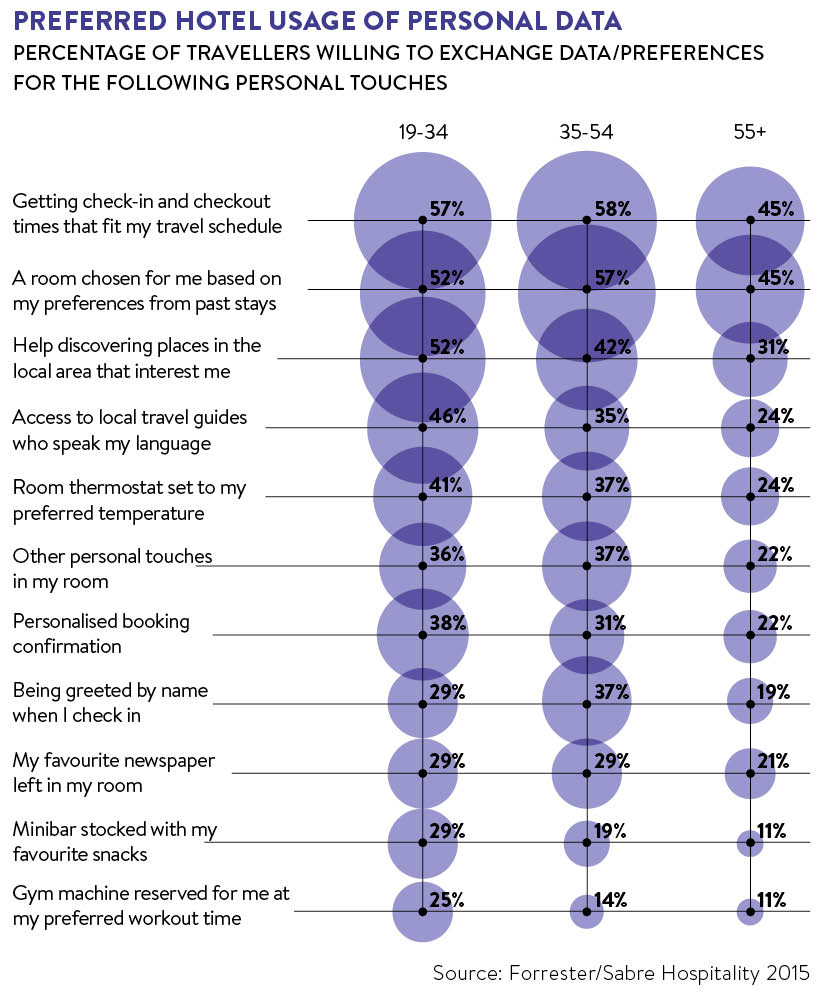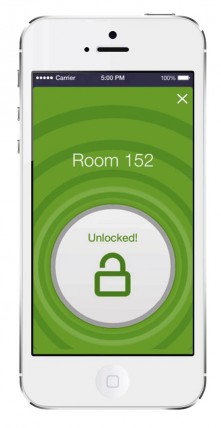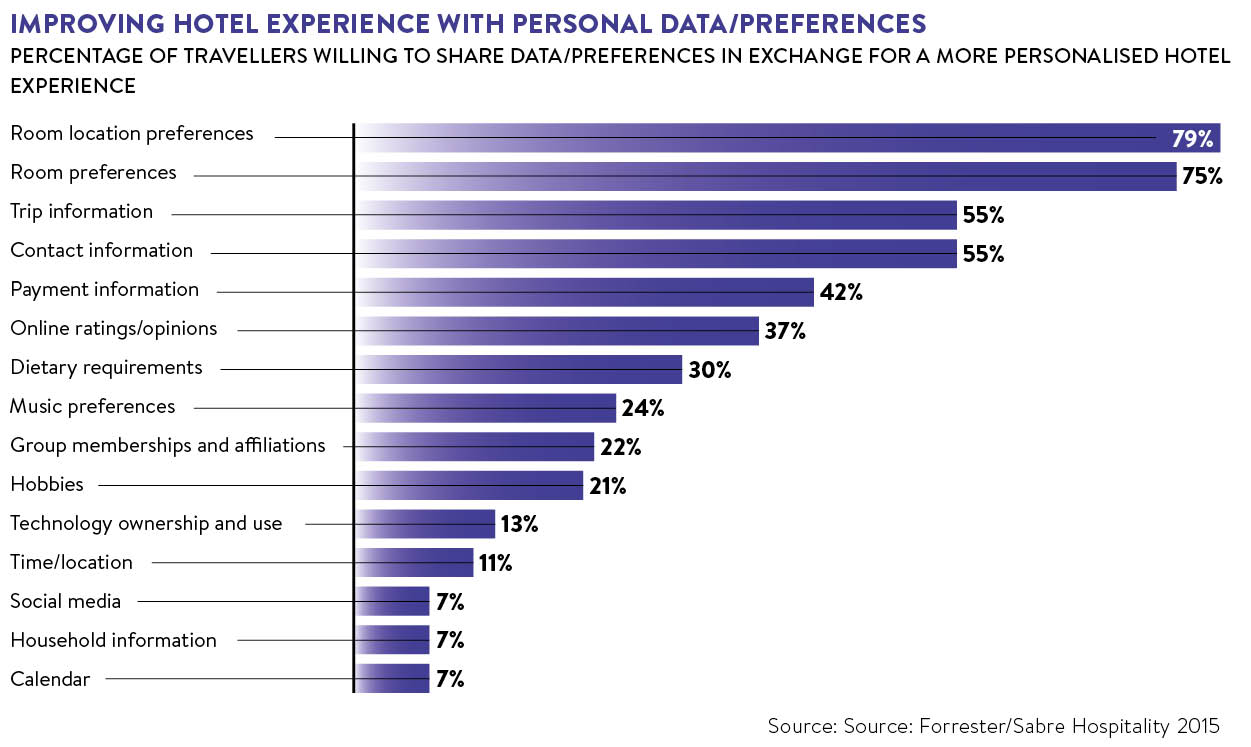We’ve all been there: the characterless hotel with the robotic staff, and all the warmth and atmosphere of Pluto. The chances are that any return visit will depend entirely on the price.
By contrast, imagine turning up at a hotel where, for example, the restaurant can suggest dishes tailored to your dietary requirements and the minibar in your room holds your favourite beer. You know from experience that you’ll get the same service at any of the chain’s hotels, so where will you book next time you go somewhere new?
According to research conducted by Forrester for Sabre Hospitality, nearly twice as many travellers prefer to stay in hotels that know them, as opposed to those offering anonymity. Older people, who tend to have more to spend, are even keener on personal service, with 42 per cent of those aged 55 and above agreeing.
And it’s not just a question of persuading guests to return by offering them the friendly, individual touch. Knowing their personal preferences allows upselling of meals, entertainment and spa facilities too.
It’s considerations like these that are increasingly leading hoteliers to take advantage of data analytics. One notable example is Denihan Hospitality Group, a boutique hotel chain that makes a personalised guest experience a major part of its offering.
Using IBM analytics technology, Denihan can sift through vast quantities of customer data, everything from customer feedback to room price, their length of stay and more, to encourage valuable guests to return. In doing so, the company found it produced more than 30 times the revenue it invested, while greatly increasing customer loyalty.
Restaurant staff are aware of customers’ food preferences; housekeepers are alerted when a guest has previously asked for an extra pillow so one can be provided this time before the guest arrives.
Data analytics is particularly helpful when it comes to targeting the most profitable customers
“What Denihan has done is not only look at massive amounts of data and different data sets, but acted on those insights quickly to provide a personalised experience for their clients that makes them want to return,” explains Erick Brethenoux, director business analytics for IBM.
“Denihan has been able to connect their data in a way that helps them create a unique guest experience and be smarter in how they do business, while more effectively using their resources to target growth areas to enter new markets.”

Targeting customers
Data analytics is particularly helpful when it comes to targeting the most profitable customers; those, say, who will take advantage of services such as golf, restaurants or a spa. Combining data on preferences such as locations, activities and room types with details of purchase behaviour such as frequency and length of stay, and time of year, can mean promotions are targeted at the right people at exactly the right time.
Much customer data is easily collected including guests’ frequency and monetary value for various hotel services. This can be combined with a loyalty programme that collects their address, preferences and so on.
Global Hotel Alliance, for example, has since 2010 been using a loyalty programme based on a customised customer relationship management (CRM) system.
GHA Discovery is based on the same principles as airline frequent flyer schemes, and means that customers’ membership status and personal preferences are recognised in all hotels in the group.
The system collects a vast amount of data, from survey responses and feedback from individual hotels to online activity such as e-mail engagement metrics – opens, clicks and opt-outs, for example – and conversion.
Crucially, data is shared between different hotel chains. As David Carey, president and chief executive of beachfront resort brand Outrigger Enterprises Group, comments: “GHA’s Discovery loyalty programme and distribution network give us access to millions of new, like-minded loyal customers from similar brands to ours, which will extend our reach within our key feeder markets, and into new markets that are not cost-efficient for us to exploit alone.”
Customer experience data
But according to Melissa Fruend, a partner at LoyaltyOne Consulting, some of the most important data that hoteliers can gather is customer experience (CX) data. It can be acquired only through diligent planning and research studies, but the pay-off is huge, says Ms Fruend.
“Unlike typical customer satisfaction surveys, by employing CX you can uncover a wealth of information about the pain points of the customer experience that can be addressed through action planning focused on operational concerns, customer engagements or even through special treatments via a loyalty programme,” she says.
Some of the most important data that hoteliers can gather is customer experience data
“For example, a large North American grocer discovered that there was a great deal of friction in the customer experience among half of their stores at the deli counter. To address slow service in these locations, they implemented several measures, including an option for loyalty programme members to pre-order their selection for a designated pick-up via their mobile app or simply enter their order at the counter via a kiosk.”

Virtual hotel keys can improve a guest’s customer experience
Similarly, she says, Hilton discovered that particularly frequent business travellers were becoming frustrated by long check-in lines at the hotel desk. To deal with the problem, the chain has provided a smartphone app allowing Hilton HHonors members to check in 24 hours in advance, then receive their room assignment and a virtual key through the app. “For a weary traveller, this is one last hassle out of their day,” says Ms Fruend.
Perhaps the best example of just how much can be done with customer data is Disney, which introduced its MagicBand system to Walt Disney World in Florida in 2013. The plastic wristbands contain a radio-frequency identification or RFID chip and a radio transmitter, and are sent out to guests before their stay.
The MagicBands can be used for everything from entering the park in the first place and unlocking the hotel room to paying for food and merchandise via a link to the user’s credit card.
Details of exactly how the system exploits the data it collects are shrouded in secrecy, but the basics are clear. The bands track the user continuously; in a restaurant, for instance, the serving staff can match each order to the correct table automatically and staff around the park can address every guest by name.
The MagicBand collects experiences, creating a photo gallery with pictures taken by the resort’s photographers or on rides, such as Splash Mountain, and bills guests automatically if they choose to download and keep the pictures.
Meanwhile, the devices are amassing vast quantities of information about where each guest is and what they are doing. This allows Disney not only to personalise its services, but also to streamline them, cutting down on the number of staff required and reducing queues. And shorter queues mean more free time for guests which means more rides and more revenue for Disney.
 You might think that customers would find collecting all this information rather invasive. Not so, says Forrester. According to its research, 51 per cent of travellers are open to sharing personal information, just as long as they get something in return, such as relevant deals, discounts or loyalty points.
You might think that customers would find collecting all this information rather invasive. Not so, says Forrester. According to its research, 51 per cent of travellers are open to sharing personal information, just as long as they get something in return, such as relevant deals, discounts or loyalty points.
Three quarters of travellers are open to sharing room preferences and more than half will consider sharing trip or contact information. In exchange, they are most interested in receiving convenient check-in and check-out times, with more than a third of travellers under 54 willing to share personal information in return for personal touches in their room.
“With all our customer research conducted, we know one thing to be true – do not collect data for data sake,” says Ms Fruend.
“The good news is consumers have evolved and they realise brands collect data from them. What irritates them is when the brand doesn’t use the data to reward the customer or acknowledge they ‘know’ them.
“So if you don’t have a data collection plan connected to a CRM strategy, then collecting data on your customer has no direction and therefore no benefit – to them or the business.”

CASE STUDY: THE UMSTEAD HOTEL AND SPA
The five-star Umstead Hotel and Spa in North Carolina prides itself on its personal service. When repeat guests check in, staff will ask whether they still prefer one particular type of room, whether they’d like to try a new spa treatment or the same one as last time – even how the family dog is getting on.
This is achieved by integrating data from the hotel’s spa, dining and reservations systems in a cloud-based, hosted environment, using SAS Master Data Management.
 It pulls data from existing systems, cleanses it and integrates it into a single view of customer interactions. It can then display this data in a web-based dashboard that all customer-facing staff can access.
It pulls data from existing systems, cleanses it and integrates it into a single view of customer interactions. It can then display this data in a web-based dashboard that all customer-facing staff can access.
“When a customer walks through our doors, we want all the information – their preferences, past stays and reservations – at our fingertips,” says George Viall, director of revenue management at The Umstead.
“With SAS Master Data Management, we can know that a customer likes to play a round of golf during most visits, followed by a massage at the spa and a cocktail in the lounge. We can not only anticipate that customer’s needs, but also suggest additional services and amenities that might make his or her stay even better.”
Integrating the various datasets has reduced duplicate entries by 52 per cent and has also allowed the hotel to see regions or customer types that could be worth exploring as new markets. “Better data means that our marketing is now more targeted,” says Mr Viall.
Top image: Walt Disney World’s Magicband system collects customer data as guests tap in and travel around the resort

Targeting customers
Customer experience data

